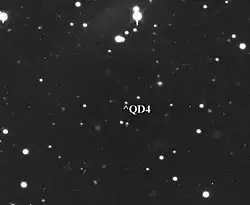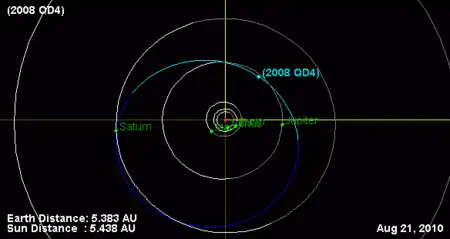 | |
| Discovery | |
|---|---|
| Discovered by | Mallorca Obs. |
| Discovery site | La Sagra Obs. |
| Discovery date | 25 August 2008 |
| Designations | |
| (315898) 2008 QD4 | |
| centaur[1][2][3] | |
| Orbital characteristics[1] | |
| Epoch 13 January 2016 (JD 2457400.5) | |
| Uncertainty parameter 1 | |
| Observation arc | 2744 days (7.51 yr) |
| Aphelion | 11.364 AU (1.7000 Tm) (Q) |
| Perihelion | 5.4531 AU (815.77 Gm) (q) |
| 8.4087 AU (1.25792 Tm) (a) | |
| Eccentricity | 0.35149 (e) |
| 24.38 yr (8906.16 d) | |
| 79.666° (M) | |
| 0° 2m 25.516s / day (n) | |
| Inclination | 42.028° (i) |
| 344.70° (Ω) | |
| 68.923° (ω) | |
| Earth MOID | 4.6941 AU (702.23 Gm) |
| Jupiter MOID | 1.46448 AU (219.083 Gm) |
| TJupiter | 2.387 |
| Physical characteristics | |
Mean diameter | 31 km[4] |
| 0.05 (assumed)[4] | |
| 11.4[1] | |
(315898) 2008 QD4, prov. designation: 2008 QD4, is a centaur orbiting in the outer Solar System with a perihelion greater than Jupiter and a semi-major axis less than Saturn.
Perihelion
2008 QD4 is listed as a centaur by the Minor Planet Center,[3] Jet Propulsion Laboratory,[1] and the Deep Ecliptic Survey (DES).[2] Of numbered objects listed as a centaur by all 3 major institutions, (315898) 2008 QD4 has the smallest perihelion distance.[3]
It came to perihelion in August 2010.[1]

Of objects listed as a centaur by all 3 major institutions, (315898) 2008 QD4 has the smallest perihelion distance. Due to a 41° orbital inclination, it is above the ecliptic plane when crossing Jupiter's orbit, and below the ecliptic when crossing Saturn's orbit.
See also
References
- 1 2 3 4 5 "JPL Small-Body Database Browser: (2008 QD4)" (last observation: 2008-10-08). Retrieved 8 April 2016.
- 1 2 Marc W. Buie (1 October 2008). "Orbit Fit and Astrometric record for 08QD4". SwRI (Space Science Department). Retrieved 17 October 2008.
- 1 2 3 "List Of Centaurs and Scattered-Disk Objects". Minor Planet Center. Retrieved 17 October 2008.
- 1 2 assumed to have an albedo just above a typical comet
External links
- (315898) 2008 QD4 at AstDyS-2, Asteroids—Dynamic Site
- (315898) 2008 QD4 at the JPL Small-Body Database
This article is issued from Wikipedia. The text is licensed under Creative Commons - Attribution - Sharealike. Additional terms may apply for the media files.